Interview: Anh Sung-jae talks Michelin stars, Culinary Class Wars, reviving Korea’s fine dining scene, and the future of Mosu
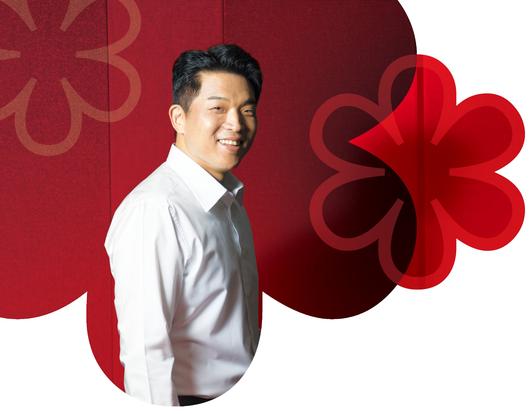 |
Michelin 3-star chef Anh Sung-jae said, "I participated in Culinary Class Wars hoping to create a positive image of chefs and help revitalize the restaurant industry, and the results have exceeded my expectations, making it all the more rewarding." He added, "Mosu will reopen early next year." / Photo by Go Woon-ho, graphics by Song Yoon-hye |
<이미지를 클릭하시면 크게 보실 수 있습니다> |
When tickets for a culinary event hosted by the Seoul Metropolitan Government opened last month, roughly 450,000 people simultaneously logged in to secure a spot. Tickets sold out within 10 seconds. At the center of this frenzy was Anh Sung-jae, South Korea’s only Michelin 3-star chef and the breakout star of Netflix’s hit cooking show Culinary Class Wars.
Anh, 42, served as a judge on the program alongside famed restaurateur Baek Jong-won. He captivated the public with his sharp critique, which focused on the taste of each dish and the chefs’ fundamental skills.
“The meat wasn’t cooked evenly.” “The most important thing to me is the degree to which vegetables are cooked.” “The seasoning was applied too tightly.” “Techniques without completion are not techniques at all.” His assessments struck a chord with viewers and have been made into memes and spread across social media. He is particularly popular with children, earning him the nickname “The next Pororo the Little Penguin.” Pororo is an animated character beloved by toddlers and children in South Korea.
“I spoke and acted like I always do in the kitchen,” Anh said during an interview with the Chosun Daily at the gourmet event. “None of it was planned or intentional, so the response has been overwhelming.”
“I participated in the show because I wanted to support the restaurant industry,” he said. “Even renowned chefs were saying they might have to close their restaurants because business was so bad. But after Culinary Class Wars, they all say they’re too busy when I reach out. It’s gratifying and rewarding to feel that the program revived the industry.”
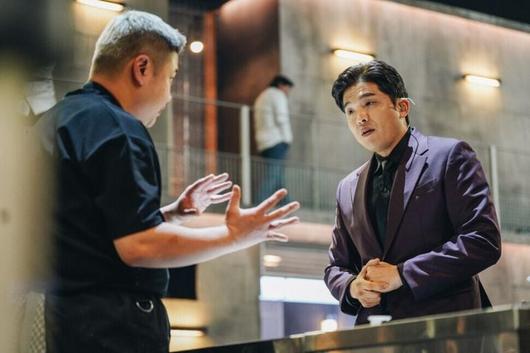 |
'Cooking Dori' Yoon Nam-no explaining his dish to Anh Sung-jae on Netflix's Culinary Class Wars. / Netflix |
<이미지를 클릭하시면 크게 보실 수 있습니다> |
“The love and support have been overwhelming”
Do you realize how popular you are?
“I get recognized so much on the street that it’s a bit embarrassing. It’s something I never expected. The restaurant staff I’ve worked with for a long time told me, “Chef, that’s just how you usually talk and approach food, so it felt authentic.” I’ve always tried to maintain professionalism when it comes to food, staff, and customers, and I think that image came across to the public as fresh and positive.”
What’s been the most surreal moment?
It must have been interesting as a grown man to be treated like a K-pop idol.
“Kids would say things like, “I want to be a chef,” or “Chefs are so cool.” I was proud knowing that my appearance on the show boosted the image of the profession.”
Any reactions from the adults?
You don’t appear on other TV shows or YouTube channels.
“Honestly, I’ve received numerous offers to join various programs. But I’ve always been deliberate about how I present myself as a chef, prioritizing pride and authenticity above all else. Some might call it arrogance or stubbornness, but I’m steadfast in preserving the principles and values that define both me and my restaurant, Mosu.”
Does that mean you’ve chosen not to pursue the path of being a ‘celebrity chef’?
Mosu, which opened in 2017 in Seoul’s Hannam-dong with investment from CJ Group, a leading South Korean conglomerate, closed earlier this year after the contract ended. Reflecting on this, Anh said, “They were invaluable partners, but we had different visions. I made the decision to part ways.” He added that he is now collaborating with a new partner outside the corporate sphere to launch another restaurant.
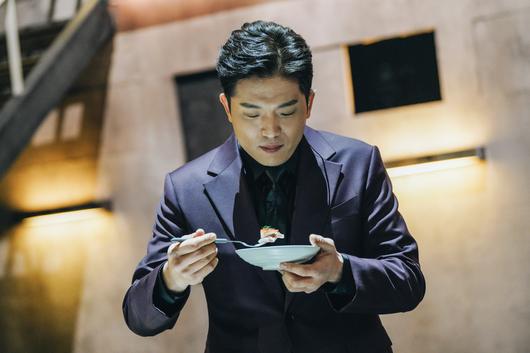 |
Chef Anh Sung-jae tastes a dish prepared by a contestant on Netflix's Culinary Class Wars. / Netflix |
<이미지를 클릭하시면 크게 보실 수 있습니다> |
There were reports that you insisted to producers, before appearing on a show, that you would not adopt the on-screen persona of British chef Gordon Ramsay, with his shouting, swearing, and throwing things in the kitchen. Is that true?
“A lot of chefs dedicate their lives and pride to their cooking. I had no desire to become a figure of comic relief.”
Was there any character-setting or scripted direction involved during your appearances?
“Not at all. The only guidance I received was to act naturally and do what I usually do.”
Did you have any disagreements with Baek Jong-won, the other judge and CEO of Theborn Korea?
“We clashed on many occasions. Honestly, I even questioned whether working with him was the right decision, and I’m sure he had similar doubts. When we first met, it seemed like he was trying to take the lead, but I’m not the type to step aside so easily (laughs). I take great pride in my expertise in food and don’t defer to anyone in that regard. Initially, there were many points where we simply couldn’t see eye to eye, but through extensive discussions, we managed to resolve our differences.”
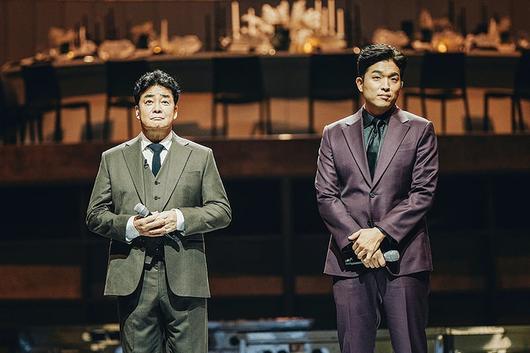 |
Chef Anh Sung-jae (right), a judge on Culinary Class Wars, alongside restaurateur Baek Jong-won. /Netflix |
<이미지를 클릭하시면 크게 보실 수 있습니다> |
What was the best dish among the 100 chefs’ creations?
“The school cafeteria cook, Lee Mi-yeong, also known as the ‘Lunch Master,’ made the most memorable dish. For me, a chef’s personality and approach to cooking are crucial, and I could feel so much love in the way she prepared her food. It felt warm and comforting. I was curious about what she’d make, and it turned out to be an actual school meal for children. When I tasted it, I thought, ‘I could eat this every day.’ In the second round, she made dakbokkeumtang (spicy braised chicken) with ogolgaes (black-boned chicken), and it was absolutely delicious. While other chefs showcased impressive technical skills and well-executed dishes, her food had a motherly touch that made it truly unforgettable.”
Will you appear in Culinary Class Wars Season 2?
“I’m grateful for the offer, but it overlaps with the reopening of Mosu, so I need to figure out the schedule. I haven’t signed anything yet, so nothing is confirmed.”
From Mechanic Dreams to Culinary Mastery
Born in Seoul, Anh Sung-jae immigrated to California with his family at the age of 13. After school, he helped out at his parents’ clothing store and worked at a local Chinese restaurant. He later joined the U.S. Army, serving as a mechanic in Iraq. Upon completing his military service, he enrolled in an automotive school to become a Porsche technician. One day, however, he saw students walking by in pristine white chef uniforms, and it immediately piqued his interest. On a whim, he visited the culinary school and decided to enroll on the spot. He was 24 at the time.
Your life seems to have taken a sharp turn.
“Culinary school completely changed my trajectory. It was marketed so well—glamorous and exciting. I got swept up in it. To be honest, I didn’t even fully understand what being a chef entailed. But once I started, I committed to giving it my all.”
Did you find a job at a restaurant as soon as you enrolled?
“I started later than most of the other students, so I wanted to gain as much experience as quickly as possible. I did everything—shucking oysters, serving tables, washing dishes and more.”
Did you enjoy cooking?
“At first, yes. The process of creating food with fire and water was fascinating. Of course, there were times I wanted to quit because it was so tough, but I realized I had no other options. I’d borrowed money to pay for culinary school, so I had to repay it. That urgency became my driving force to keep going.”
Determined to work at the most expensive restaurant in Los Angeles, Ahn volunteered at Urasawa, a prestigious sushi bar in Beverly Hills, without pay. Later, he gained invaluable experience at The French Laundry, one of America’s top fine dining establishments.
Is it true you couldn’t afford a proper place to live and stayed in a shack in the middle of Napa Valley vineyards?
“People thought I was crazy. They’d say things like, ‘You’re out of your mind,’ or something along those lines. Sure, I had no money and couldn’t afford proper meals or new clothes, but it didn’t bother me. I was doing what I loved—cooking. I always believed that someday, as a chef, I’d create something remarkable. Looking back, it might seem foolish, but those choices made me who I am today.”
What makes you so passionate about being a chef?
“At The French Laundry, Chef Corey Lee (Korean name Lee Dong-min), the owner chef of Benu, gave me a book, Great Chefs of France. It was about legendary chefs who lived and breathed cooking. Their dedication and lifestyles were inspiring. For some reason, I’ve always chosen the harder path, but maybe that’s why this career feels so rewarding. Being a chef allows me to express myself through food and build a team that works in harmony within a restaurant—a little society of its own. I love that.”
Anh’s resume is impressive. After Benu, San Francisco’s first Michelin three-star restaurant, he became the executive chef at Aziza, a Moroccan fine dining spot, where he earned a Michelin star. In 2015, he opened his own restaurant, Mosu, in San Francisco, which also achieved a Michelin star within its first year.
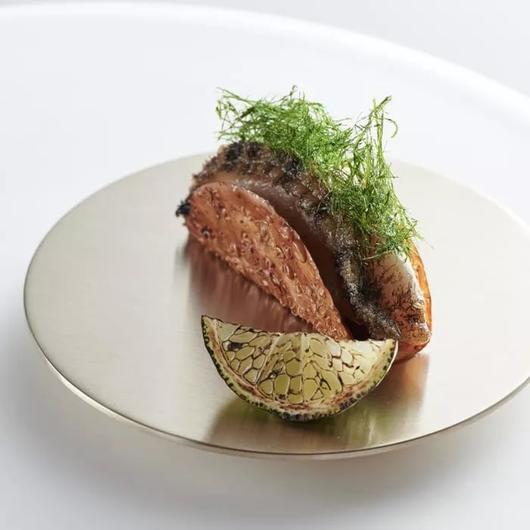 |
Mosu's signature dish: Abalone Taco. /Chosunilbo DB |
<이미지를 클릭하시면 크게 보실 수 있습니다> |
You seem to prefer challenges over comfort.
“That’s true. I feel uneasy when I’m not pushing myself.”
Your kitchen at Mosu is known for being exceptionally demanding.
“My team doesn’t casually chat with me in my restaurant. The expectations are high, and the pressure is intense. I have no patience for people who aren’t diligent. In fact, some have stormed out, swearing as they quit. It’s tough, but I only want to work with those who share my level of commitment.”
Is it okay to work like that these days?
“I’ve received a few complaint calls from parents, saying ‘my daughter came home crying.’ I can understand—if I were a parent, I’d feel the same way. I explained, ‘I’m sorry, that was never my intention. Our kitchen operates under high tension and pressure, with very high standards. I’d recommend your child work somewhere brighter and less demanding.’ I always try to explain logically, so I’ve never been sued, but I do worry about getting stabbed in the back someday (laughs).”
What’s the most important quality for a chef?
“Patience. I believe only dedicated individuals can endure this profession. It needs patience to resist the temptation to cut corners and allows you to win the battle against yourself.”
What makes a dish perfect?
“It has to be heartfelt. Even in a humble, inexpensive diner, if love and care go into the food, it’s the ultimate dish. That’s why chefs often talk about the flavors of their mother’s or grandmother’s cooking. At Mosu, we emphasize bringing that same spirit to our work.”
Is it true that Mosu’s staff take dance classes?
“When I worked at The French Laundry, I once suggested grabbing a drink over the weekend, but my colleague said they had ballet lessons. The owner-chef encouraged it and even covered the tuition. I noticed a difference in how they moved—the way they bent their wrists or extended their arms was smooth and elegant, almost like dancers. It was miles apart from simply placing a dish on a table. At Mosu, I’ve never forced anyone to do it, but I do encourage it by saying, ‘If you take ballet lessons, I’ll support you.’ If they don’t, I save money anyway (laughs).”
Not Cooking to Earn Stars
Chef Anh moved Mosu to Seoul in 2017 to take on a new challenge. After earning one Michelin star, then two, Mosu was awarded three stars in 2023. The restaurant, which temporarily closed earlier this year following the end of its partnership with CJ, has postponed its reopening to February next year.
Is it the so-called “Michelin curse,” where restaurants fail after receiving stars?
“The ‘Michelin curse’ is a misunderstanding—it’s more about the characteristics of the Korean market. In the U.S., there’s a kind of formula where prices increase when a restaurant goes from two to three stars. There’s a clear distinction between the two in terms of ingredients (software) and interiors (hardware). But in Korea, just because you move up to three stars doesn’t mean you can raise prices. The fine dining scene here is still young, but I believe it will change over time.”
Do you have any plans to open a more casual restaurant?
“I’m preparing for it. I don’t want to open a restaurant that compromises on quality just because of fame. I’d like to create a casual restaurant with its own philosophy and direction. I’ve already hired a chef, and I’m currently working on the menu and location. I hope to open by the end of the year, but things always take longer than expected.”
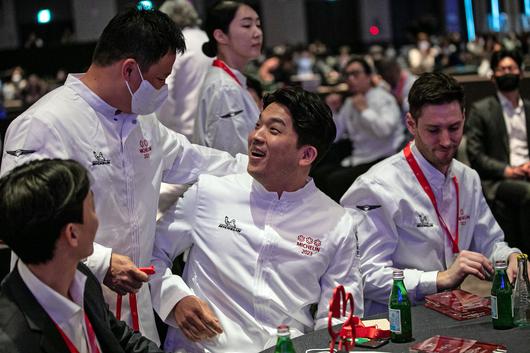 |
Chef Anh Sung-jae (center) is congratulated by fellow chefs after receiving three stars in the 2023 Michelin Guide. /News1 |
<이미지를 클릭하시면 크게 보실 수 있습니다> |
Mosu may be excluded from the Michelin Guide, as it has been closed for a year, even if it reopens.
“It’s not a possibility—it’s a certainty. The Michelin Guide relies on anonymous inspections, but we’re automatically excluded since we haven’t been in operation. The same applies to the World’s 50 Best Restaurants (W50B). Truthfully, we could have reopened in Gangnam as early as September if we had rushed. However, I wanted to welcome guests in a setting and format I could truly take pride in, and that required time. I didn’t anticipate the delay would stretch until February of next year, but even if it means losing our three-star status, my focus has been on creating an evolved version of Mosu. It’s disappointing, but I made the bold decision to start fresh.”
Are you planning to reclaim Michelin stars?
“I didn’t establish Mosu to chase stars. I’ve sustained my career because I genuinely love the lifestyle of a chef. I never saw working at Mosu as just a job. That mindset eventually led to earning three stars, but it was never my ultimate goal. Even now, my priority is to keep doing what I love for as long as possible.”
Can you share why yakgwa continues to be the signature item on Mosu’s dessert menu?
“My grandmother learned how to make yakgwa from a court cuisine expert. She was originally from North Korea and often prepared Kaesong yakgwa and naengmyeon for us. During the holidays, she would sell yakgwa, filling the house with the scent of ginger and oil. Back then, I hated it, but now it feels like an inseparable part of me. I plan to reinterpret her recipe and craft my own version of yakgwa.”
Do you cook for your family at home?
“My wife usually handles the cooking because she loves it. When the kids ask, ‘Dad, can you make us an omelet?’ I step in and cook. And when it comes to steak, the kids know—Dad’s steak is better (laughs). If my wife says, ‘The fridge is too full,’ I’ll clear it out by whipping up a variety of dishes. Even three-star chefs enjoy making instant noodles at home.”
 |
Chef Anh Sung-jae (center) holding a trophy after winning an amateur boxing competition. /Screenshot from Instagram |
<이미지를 클릭하시면 크게 보실 수 있습니다> |
You recently won an amateur boxing competition, didn’t you?
“I used to wrestle as a kid, and during my military service, I trained with larger colleagues. Running a restaurant is stressful, so I joined a martial arts gym as an outlet, and it turned out to be incredibly fun. It might sound silly, but I thought, ‘I’m going to be a world champion,’ and trained hard. It’s added so much richness to my life that I’ve stuck with it.”
If you were to recommend three restaurants to foreigners visiting Seoul, which ones would you choose?
“The first that comes to mind is Mingles, run by Chef Kang Min-goo. I also enjoy local spots in my neighborhood. There’s a dumpling place called Mandu (Dumpling) Jeonbbang, which often has long lines, so I go early for their dumpling hot pot. Another favorite is Wangsimni Ori Sanyang inside Haengdang Market.”
If the world were to end tomorrow, what would your last meal be?
“I wouldn’t be able to have my grandmother’s cooking, so I’d choose sushi. With good sushi, you can feel the chef’s care in every bite. Having worked with sushi myself, I can instantly tell who is meticulous and who is cutting corners.”
How can you tell?
“By their posture or the angles at which they hold and use their knives. It’s evident in how they prepare their ingredients, from the precision of their cuts to the direction they place their knives. Even before tasting, their technique and attention to detail reveal their level of care and professionalism.”
[Kim Sung-yoon]
- Copyrights ⓒ 조선일보 & chosun.com, 무단 전재 및 재배포 금지 -
이 기사의 카테고리는 언론사의 분류를 따릅니다.
언론사는 한 기사를 두 개 이상의 카테고리로 분류할 수 있습니다.


